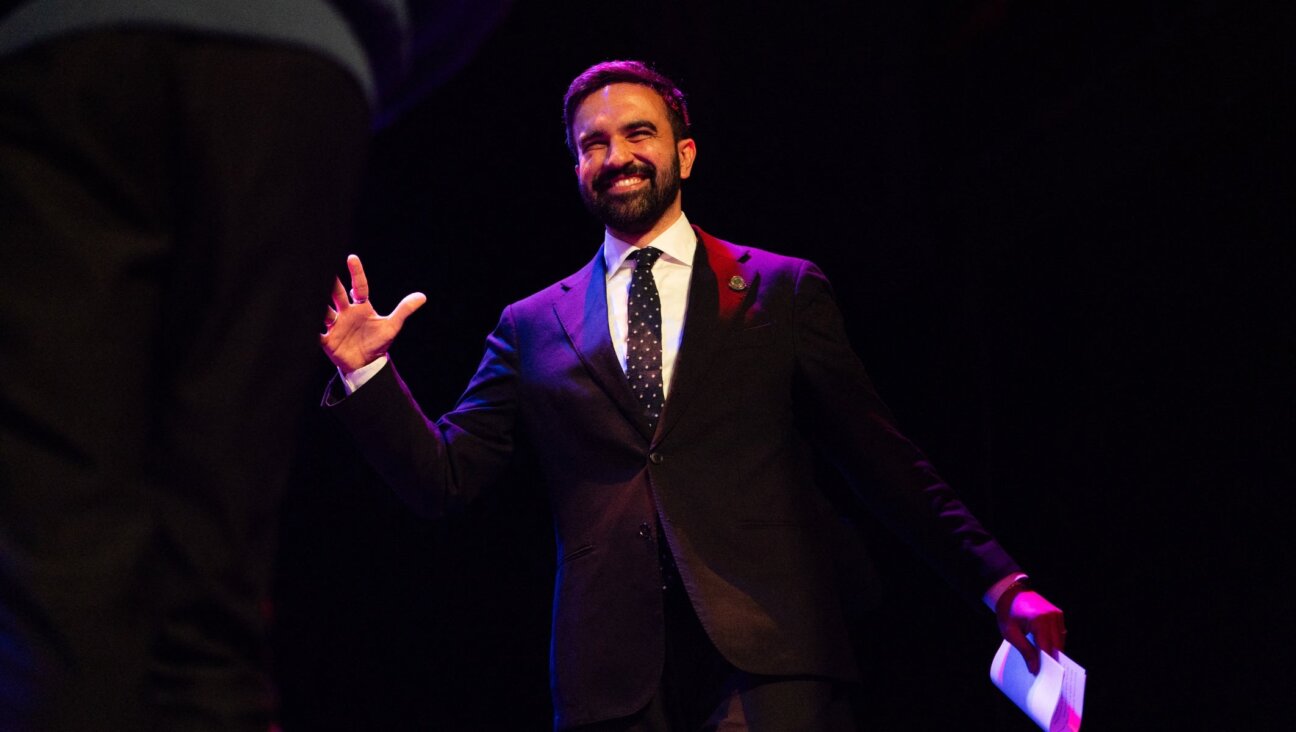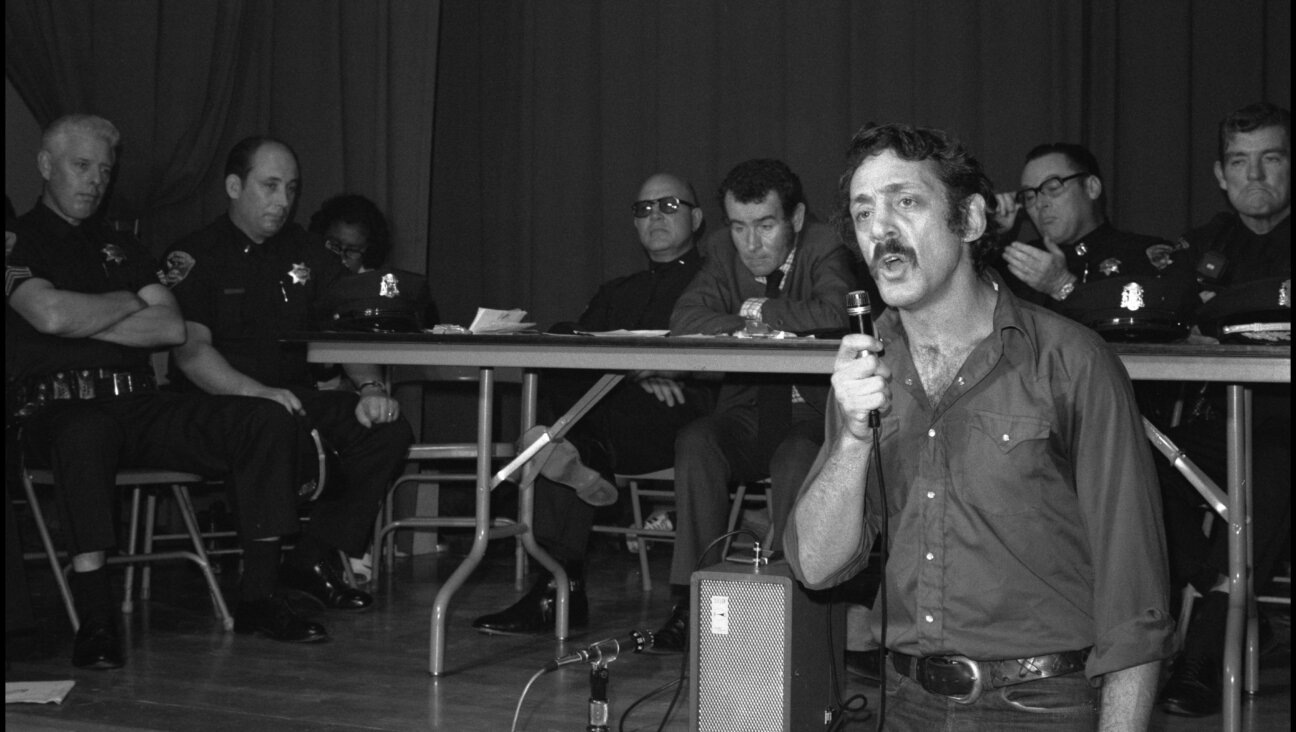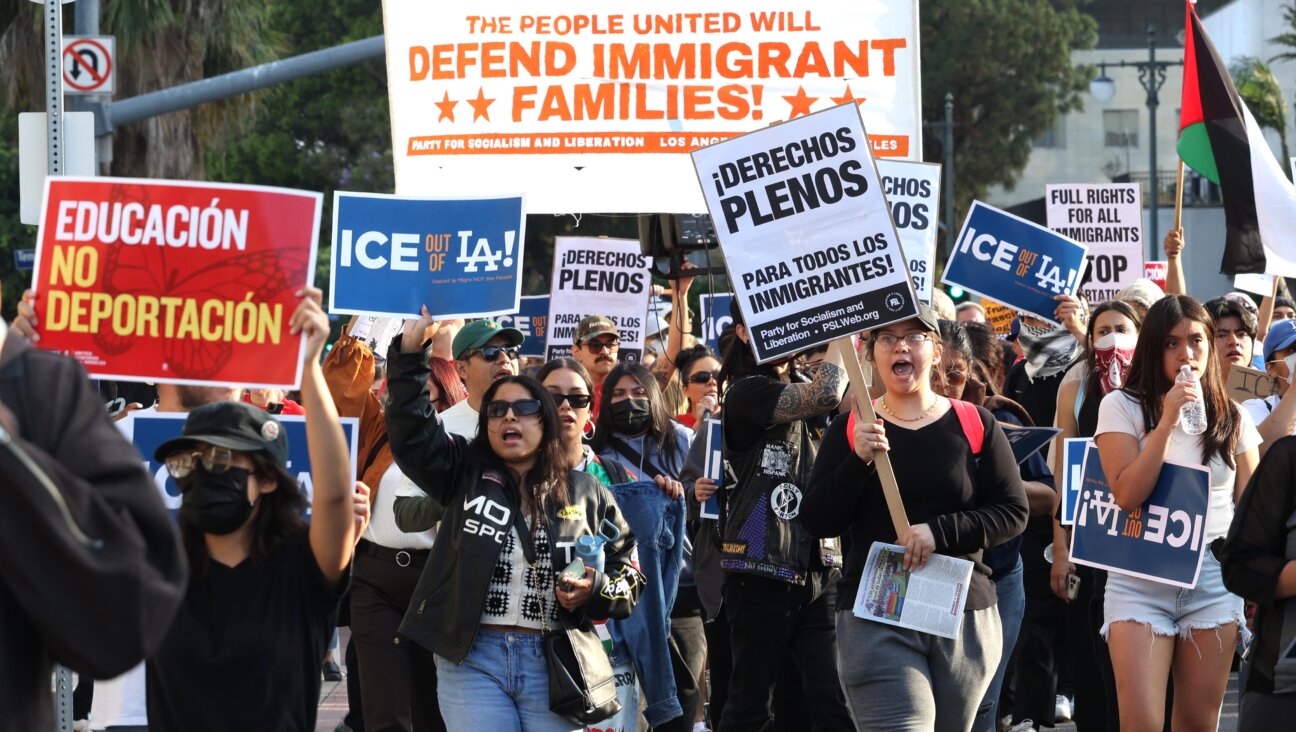NYC Mayor Adams pushes controversial antisemitism definition as issue dominates mayoral election
With rivals battling for Jewish votes, Adams takes action on antisemitism that builds on their campaign pledges
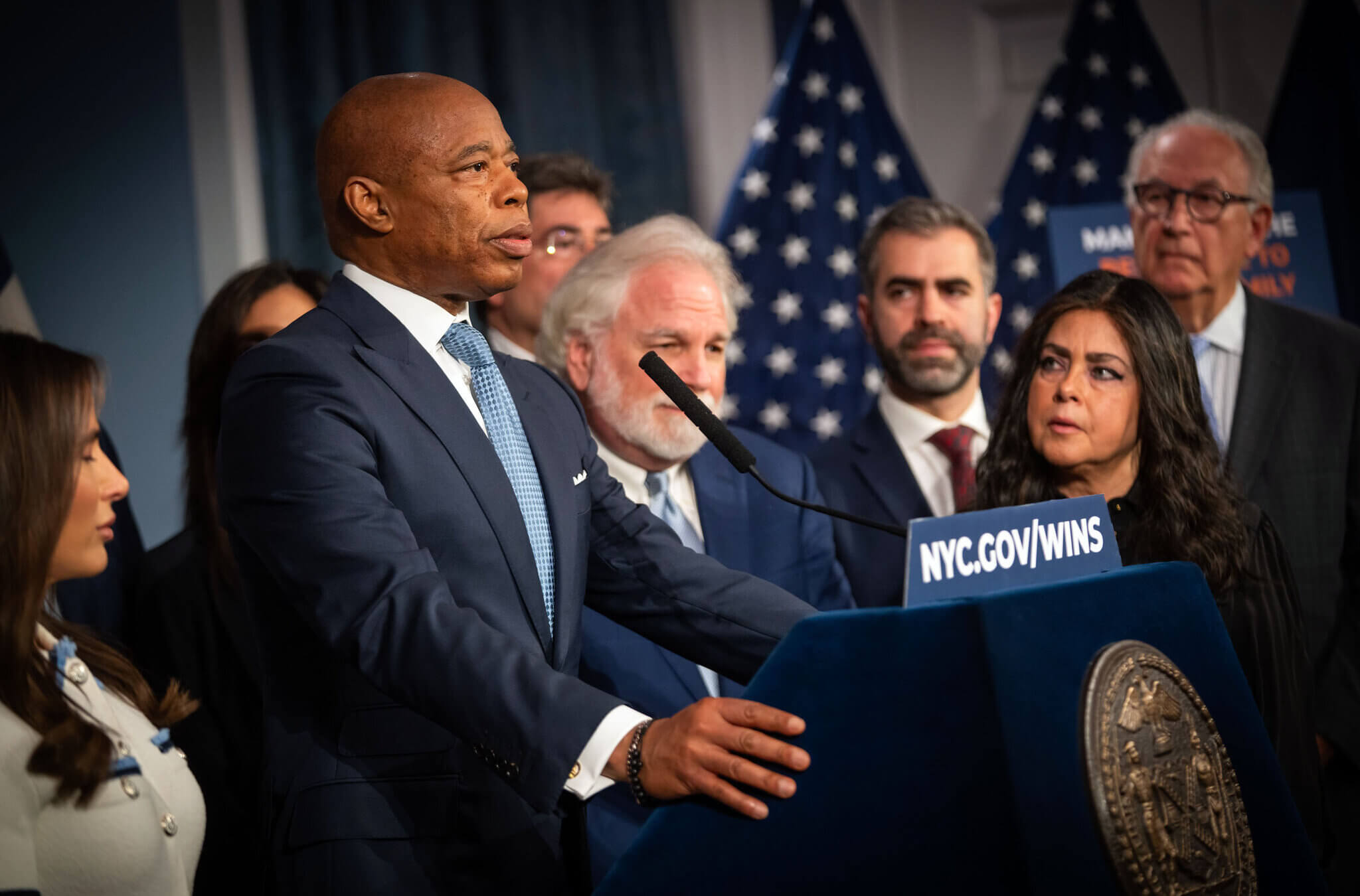
NYC Mayor Eric Adams on May 13. Photo by Ed Reed/Mayoral Photography Office
Mayor Eric Adams is getting the jump on his rivals in the November mayoral race by adopting a controversial definition of antisemitism, a key issue in the crowded campaign.
Adams announced an executive order on Sunday adopting the International Holocaust Remembrance Alliance definition of antisemitism, which labels most forms of anti-Zionism as antisemitic. Critics, including progressives and Jewish advocacy groups, warn it could chill free speech.
Adams signed the order Sunday evening at Tribeca Synagogue in downtown Manhattan. The event featured a panel discussion with Dr. Phil, the daytime TV star who has recently aligned his political views with those of President Donald Trump. In his introduction of Adams, McGraw told the crowd, “I can tell you from my heart, that man is not just your mayor. He is your brother. He and he alone, among those who seek to lead this great city, can say that.”
Adams has made combating antisemitism central to his campaign. Elected as a Democrat in 2021, he has since left the party and is running for reelection on an independent line dubbed “End Antisemitism.”
The executive order adopting the IHRA definition is the first initiative of the office he established to combat antisemitism. Adams is also urging the City Council to codify the IHRA definition into law. An aide to Council Speaker Adrienne Adams did not immediately respond to a question about whether she would support the mayor’s legislation. In a questionnaire for the UJA-Federation, she said that the definition should serve as a “guiding point for education, training, and other resources” used by city governments, and that she would explore issuing an executive order if elected as mayor.
What the candidates are saying
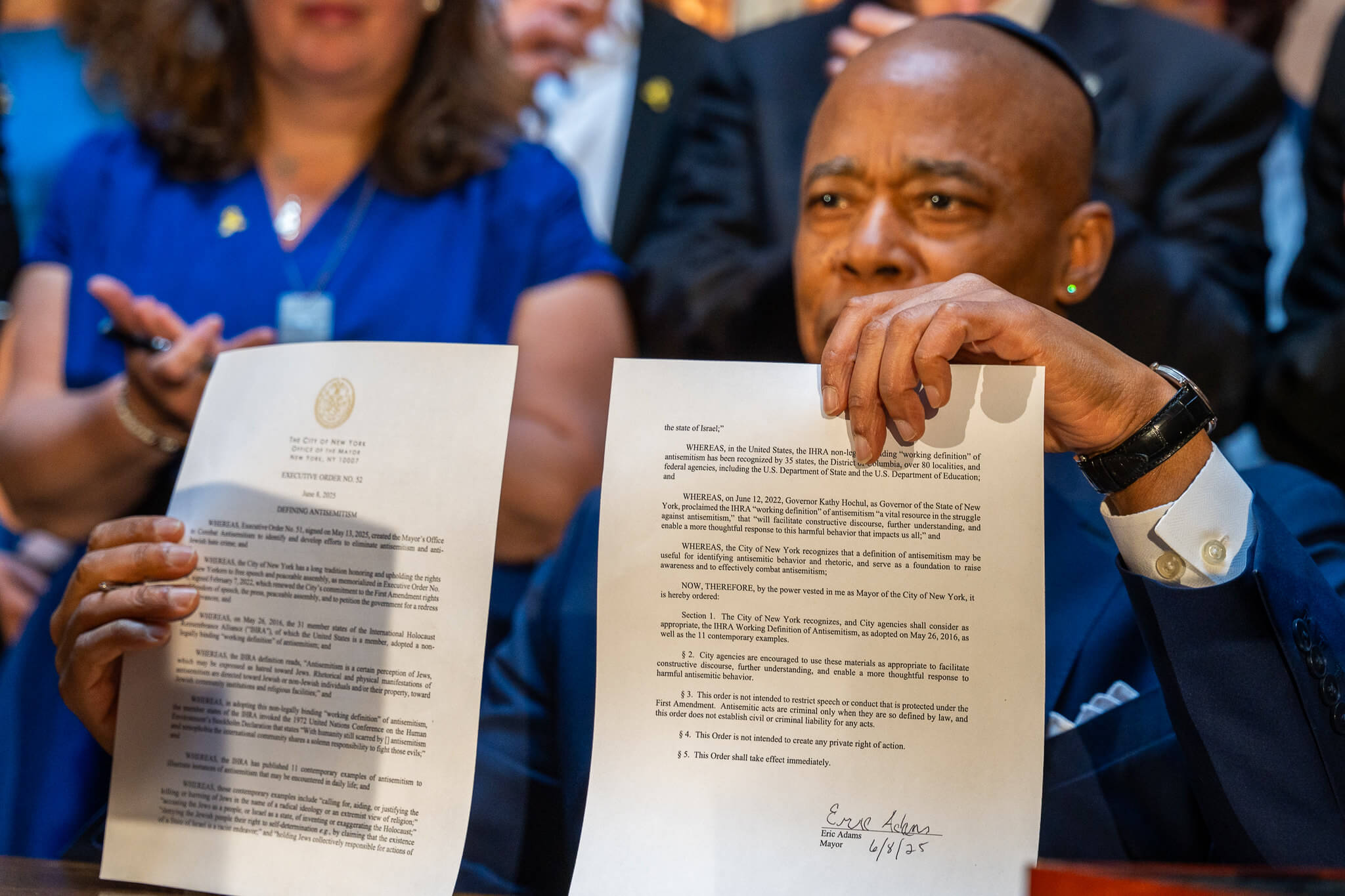
Ahead of the June 24 Democratic primary, most of the candidates have directly addressed the issue or outlined specific proposals in their outreach to Jewish voters.
Former Gov. Andrew Cuomo, former Controller Scott Stringer and investor Whitney Tilson pledged to adopt the IHRA definition if elected. Others, including Brad Lander, who is Jewish, have argued that the definition would suppress criticism of Israeli policy.
Zohran Mamdani, a Democratic Socialist and a vocal critic of Israel who identifies as anti-Zionist, has spoken out against the use of measures which he says silence Palestinian voices and their allies. Mamdani is running second behind front-runner Cuomo.
Most of the mayoral hopefuls vowed to appoint advisors on antisemitism. Adrienne Adams pledged to appoint a deputy mayor solely focused on antisemitism and Jewish issues.
The focus on antisemitism comes amid a sharp rise in antisemitic incidents in the city home to the largest Jewish population outside of Israel.
Antisemitism was up 18% in New York last year, with 68% of the 1,437 incidents occurring in New York City, according to the Anti-Defamation League. In the first quarter of 2025, NYPD data shows antisemitic acts made up 62% of all reported hate crimes citywide.
“It’s time we all come together to eradicate this hatred from our city, once and for all,” Adams said in prepared remarks.
Adams has since his first campaign cultivated the Jewish vote,
The Mayor’s Office to Combat Antisemitism, launched last month, is headed by Adams’ Jewish liaison, Moshe Davis. Earlier in his term, Adams formed the city’s first Jewish Advisory Council and launched the city’s first “Breaking Bread, Building Bonds” initiative to broaden connections between communities of all faiths.
A national conversation
Major Jewish organizations, including the Anti-Defamation League, the Conference of Presidents of Major American Jewish Organizations, the Israeli-American Council, Combat Antisemitism Movement and StandWithUs, praised Sunday’s order and were present at the signing. So were Orthodox leaders who have endorsed Cuomo in the primary.
Yehuda Kaploun, Trump’s nominee for the U.S. special envoy to monitor and combat antisemitism, also issued a statement in support.
Ken Marcus, a top civil rights official in the first Trump administration who led efforts to fight antisemitism on campus, said Adams’ example “should be followed nationwide” and be implemented in “every city and state.”
The adoption of the IHRA definition of antisemitism has been a point of contention in the Jewish community in recent years. Some Jewish figures are calling for a more precise definition that would preserve speech freedoms. Others say IHRA is needed right away and that any attempt to stop its momentum undermines efforts to protect Jews.
Efforts to make IHRA law are underway in multiple states. A bill is under consideration in the New York state legislature and IHRA has been an issue in the competitive New Jersey governor’s race. Congressional legislation known as the Antisemitism Awareness Act, which would require the federal government to rely on the definition, has stalled.
Last week, all nine Democratic mayoral hopefuls criticized Trump’s recent actions against top universities over his administration’s handling of pro-Palestinian campus protests. Cuomo, who has made fighting antisemitism a central theme of his campaign, agreed that stripping Columbia University of its accreditation and withholding funding from other universities over allegations of antisemitism was “overreach”.
Adams, trailing in general election polls, is hoping that by taking immediate action and garnering nationwide attention, his campaign will resonate with many Jewish voters across ideological lines, even those who have committed to supporting other candidates in the Democratic primary.








